- Home » Expat Articles » Interviews » British Expat Living in Colombia - Interview with Naomi
British Expat Living in Colombia - Interview with Naomi
| Published: | 8 Nov at 9 AM |
Want to get involved?
Become a Featured Expat and take our interview.
Become a Local Expert and contribute articles.
Get in touch today!
Become a Local Expert and contribute articles.
Get in touch today!
Filed: Interviews,Colombia
Naomi has lived in Argentina, Mexico and most recently Bogota, Colombia (for reasons of the heart...). Adapting to life in Bogota has been one of her greatest challenges in life yet! Thus she has used her blog How to.. Bogota to reflect on these experiences, and to offer tips to others who plan to move to Colombia's chaotic capital! Naomi's expat blog is called How to.. Bogota (see listing here)
Where are you originally from?
I was born and raised in south-east London, and attended Queen Mary, University of London, where I graduated in Hispanic Studies and French Studies.
In which country and city are you living now?
Bogota, Colombia.
How long have you lived in Colombia and how long are you planning to stay?
I arrived here in October 2013, and will be here for the foreseeable future, reasons of the heart being what brought me here :)
Why did you move to Colombia and what do you do?
My boyfriend is Colombian and it was much less complicated for me to move and settle here than it would have been for him to move to the UK to be with me. I currently teach English at the British Council and work as a freelance teacher, translator and proof-reader.
Did you bring family with you?
No, but I had my new Colombian family here waiting for me!
How did you find the transition to living in a foreign country?
I've written a couple of blog-posts entitled "Finding my identity in Bogota" and "The 5 Stages of Culture Shock in Bogota", in which I think I sum up fairly well how my transition to life in Bogota has been. There have been ups and downs, but one year on I think I am gradually reaching a happy medium.
Was it easy making friends and meeting people; do you mainly socialise with other expats?
Much of my free time is spent with my boyfriend and his family, though I do have a couple of good ex-pat friends who I meet up with for our monthly book-club. There's also a good ex-pat night at a bar called La Villa in Bogota's Zona Rosa called 'Gringo Tuesdays', where Colombians and ex-pats alike can meet up for a friendly, informal language exchange and a beer (or five!). I've been along once and it's a good place to meet people if you're new to the city.
What are the best things to do in the area; anything to recommend to future expats?
There isn't much nature or peace and quiet on offer in Bogota, but there is SOME and it's worth taking the time to enjoy it when you can! Go and visit Bogota's tranquil and pretty Botanical Gardens - you may even see a humming-bird! The air is also so fresh... Check out Simon Bolivar Park too (Bogota's 'Central Park') - bring a picnic one quiet afternoon during the week, or enjoy the bustle of Sundays in the park when everyone (and their dog) goes there! Or how about a gentle walk up the ciclovia on 7th Avenue (carrera 7) on a Sunday? This is when the main roads are closed to traffic until 2pm, and people can walk, cycle, roller-blade or skateboard freely and in relative peace! Walk up to Hacienda Santa Barbara shopping mall, and browse the beautiful artwork and souvenirs on sale in Usaquén's market, before deciding on which of the many restaurants to go to for your Sunday lunch!
What do you enjoy most about living in Colombia?
I enjoy looking out of the window of my apartment and seeing the beautiful, imposing green mountains just a few blocks away. You also get some really spectacular skies in Bogota, which you'd never see in London.
How does the cost of living in Colombia compare to home?
Bogota is relatively expensive. Rent is much cheaper than in London (probably about a third of the price for an apartment); the cost of public transport, taxis and eating out is also cheaper, but groceries, clothes, electronics, and gym membership are about the same price or more expensive than in the UK. Having built up a portfolio of different freelance jobs, I am earning roughly the same as I was earning after tax in my last full-time job in London, but the money does go a lot further here, and I'm able to save some money each month.
What negatives, if any, are there to living in Colombia?
The noise, pollution, TRAFFIC, the generally indifferent and inconsiderate attitudes of the people towards each other, a tendency towards opportunistic behaviour (i.e. to screw over thy neighbour whenever the opportunity arises), the reckless drivers, the poor condition of the roads, the lack of cultural diversity which I was used to in London...
If you could pick one piece of advice to anyone moving to Colombia, what would it be?
Learn Spanish. Not many people here speak good English and it will make the adaptation and integration process a lot easier for you. Learn how to be patient and stay calm, even in the most frustrating situations (which will inevitably become a frequent occurrence!). Never ask a taxi driver how much you owe him, as you'll be inviting him to overcharge you - wait for him to tell you, or preferably learn how to read the tariff for yourself (or download an app which will calculate it for you - see my blog for more info!). If you're in a market buying something (this especially applies to ANYTHING you buy in Cartagena!) bargain as though your life depends on it; the first prices they quote are often at least double what they would let something go for if you stand your ground!
Also, try to live close to where you'll be working, studying or hanging out the most. Having to travel across the city on a daily basis is the most stressful thing about Bogota, whether you're in a car, bus or taxi - try to avoid being in that situation, if at all possible!
What has been the hardest aspect to your expat experience so far?
I'm not a big fan of the Colombian food, and parasites in food and drink are quite common here. I also discovered that it's not a good idea to drink the tap water. It took my stomach a good 8-9 months to adapt to the new diet and routine here - it was regularly upset and causing me discomfort/pain, which isn't pleasant when you're also trying to adapt to so many other things!
It was very hard at one point when I had to take the Transmilenio or bus for 45 minutes each way every day to go to work... the conditions during rush hour are horrible and people (and bus drivers) are really inconsiderate. Life got a lot better once I moved to an apartment on the other side of the city and I could walk to work!
When you finally return home, how do you think you'll cope with repatriation?
I'm not sure if or when I'll be returning to the UK; I miss London a lot... I'd even say I pine for it daily! But my current situation in Bogota does allow me a lot of freedom and independence (as most of my work is freelance) which would be very difficult to replicate in London. Furthermore, the money I make wouldn't go half as far back home. I think that wherever you are, something's always gotta give, and in the end you have to decide which things mean most to you in life.
What are your top 5 expat tips for anyone following in your footsteps?
After a couple of months of feeling completely disorientated in Bogota, I realised that I really would have appreciated a 'Bogota handbook' full of survival tips! So the How to.. Bogota blog started out as a guide for tourists and ex-pats who were new to Bogota. As time went by, I started to find myself faced with new personal challenges, such as how and where I fitted into the paradigm of Bogota's society, and whether I could ever really be happy here. I then realised that, one year on, I am still suffering from the effects of culture shock, and that when you move somewhere indefinitely (i.e. without a fixed departure date in mind) it takes much longer than you think it will to adapt, especially when you're not a big fan of the city in the first place! So I started to use my blog to reflect on these experiences, and hope that it may be of some help to other ex-pats who find themselves experiencing similar emotions.
How can you be contacted for further advice to future expats coming to your area?
Go to the contact page on my blog, and I'll be happy to respond to any questions!
Here's the interview with Naomi...
Where are you originally from?
I was born and raised in south-east London, and attended Queen Mary, University of London, where I graduated in Hispanic Studies and French Studies.
In which country and city are you living now?
Bogota, Colombia.
How long have you lived in Colombia and how long are you planning to stay?
I arrived here in October 2013, and will be here for the foreseeable future, reasons of the heart being what brought me here :)
Why did you move to Colombia and what do you do?
My boyfriend is Colombian and it was much less complicated for me to move and settle here than it would have been for him to move to the UK to be with me. I currently teach English at the British Council and work as a freelance teacher, translator and proof-reader.
Did you bring family with you?
No, but I had my new Colombian family here waiting for me!
How did you find the transition to living in a foreign country?
I've written a couple of blog-posts entitled "Finding my identity in Bogota" and "The 5 Stages of Culture Shock in Bogota", in which I think I sum up fairly well how my transition to life in Bogota has been. There have been ups and downs, but one year on I think I am gradually reaching a happy medium.
Was it easy making friends and meeting people; do you mainly socialise with other expats?
Much of my free time is spent with my boyfriend and his family, though I do have a couple of good ex-pat friends who I meet up with for our monthly book-club. There's also a good ex-pat night at a bar called La Villa in Bogota's Zona Rosa called 'Gringo Tuesdays', where Colombians and ex-pats alike can meet up for a friendly, informal language exchange and a beer (or five!). I've been along once and it's a good place to meet people if you're new to the city.
What are the best things to do in the area; anything to recommend to future expats?
There isn't much nature or peace and quiet on offer in Bogota, but there is SOME and it's worth taking the time to enjoy it when you can! Go and visit Bogota's tranquil and pretty Botanical Gardens - you may even see a humming-bird! The air is also so fresh... Check out Simon Bolivar Park too (Bogota's 'Central Park') - bring a picnic one quiet afternoon during the week, or enjoy the bustle of Sundays in the park when everyone (and their dog) goes there! Or how about a gentle walk up the ciclovia on 7th Avenue (carrera 7) on a Sunday? This is when the main roads are closed to traffic until 2pm, and people can walk, cycle, roller-blade or skateboard freely and in relative peace! Walk up to Hacienda Santa Barbara shopping mall, and browse the beautiful artwork and souvenirs on sale in Usaquén's market, before deciding on which of the many restaurants to go to for your Sunday lunch!
What do you enjoy most about living in Colombia?
I enjoy looking out of the window of my apartment and seeing the beautiful, imposing green mountains just a few blocks away. You also get some really spectacular skies in Bogota, which you'd never see in London.
How does the cost of living in Colombia compare to home?
Bogota is relatively expensive. Rent is much cheaper than in London (probably about a third of the price for an apartment); the cost of public transport, taxis and eating out is also cheaper, but groceries, clothes, electronics, and gym membership are about the same price or more expensive than in the UK. Having built up a portfolio of different freelance jobs, I am earning roughly the same as I was earning after tax in my last full-time job in London, but the money does go a lot further here, and I'm able to save some money each month.
What negatives, if any, are there to living in Colombia?
The noise, pollution, TRAFFIC, the generally indifferent and inconsiderate attitudes of the people towards each other, a tendency towards opportunistic behaviour (i.e. to screw over thy neighbour whenever the opportunity arises), the reckless drivers, the poor condition of the roads, the lack of cultural diversity which I was used to in London...
If you could pick one piece of advice to anyone moving to Colombia, what would it be?
Learn Spanish. Not many people here speak good English and it will make the adaptation and integration process a lot easier for you. Learn how to be patient and stay calm, even in the most frustrating situations (which will inevitably become a frequent occurrence!). Never ask a taxi driver how much you owe him, as you'll be inviting him to overcharge you - wait for him to tell you, or preferably learn how to read the tariff for yourself (or download an app which will calculate it for you - see my blog for more info!). If you're in a market buying something (this especially applies to ANYTHING you buy in Cartagena!) bargain as though your life depends on it; the first prices they quote are often at least double what they would let something go for if you stand your ground!
Also, try to live close to where you'll be working, studying or hanging out the most. Having to travel across the city on a daily basis is the most stressful thing about Bogota, whether you're in a car, bus or taxi - try to avoid being in that situation, if at all possible!
What has been the hardest aspect to your expat experience so far?
I'm not a big fan of the Colombian food, and parasites in food and drink are quite common here. I also discovered that it's not a good idea to drink the tap water. It took my stomach a good 8-9 months to adapt to the new diet and routine here - it was regularly upset and causing me discomfort/pain, which isn't pleasant when you're also trying to adapt to so many other things!
It was very hard at one point when I had to take the Transmilenio or bus for 45 minutes each way every day to go to work... the conditions during rush hour are horrible and people (and bus drivers) are really inconsiderate. Life got a lot better once I moved to an apartment on the other side of the city and I could walk to work!
When you finally return home, how do you think you'll cope with repatriation?
I'm not sure if or when I'll be returning to the UK; I miss London a lot... I'd even say I pine for it daily! But my current situation in Bogota does allow me a lot of freedom and independence (as most of my work is freelance) which would be very difficult to replicate in London. Furthermore, the money I make wouldn't go half as far back home. I think that wherever you are, something's always gotta give, and in the end you have to decide which things mean most to you in life.
What are your top 5 expat tips for anyone following in your footsteps?
- Learn the language. It will help a lot in terms of settling in and you will less likely become the victim of opportunistic behaviour.
- If you arrive here alone, go out to as many social events as possible and make friends; join a team or book-club, find a weekly event to attend (such as Gringo Tuesdays at La Villa) so that you regularly see the same people and can talk about your experiences, and to help your life take on some kind of routine. Your country's embassy will often be able to give you information about local cultural or ex-pat events - get yourself on the mailing list!
- Before you accept a job offer, shop around - especially if you plan on teaching English. There are a LOT of cowboy institutes in Colombia that pay badly and are only interested in making money by exploiting desperate ex-pats in need of work and Colombians who have no idea about effective teaching methodologies. If you're serious about teaching English, invest in a CELTA course at International House or the British Council in Bogota (I can personally recommend the latter, as I did mine there), because this will open the door to a vast number of jobs with much better salaries and working conditions.
- It is worth owning a smartphone to help you to navigate the city in the beginning. There are many useful (even essential!) apps, which I've mentioned on my blog, such as apps for hailing secure taxis, ordering takeaways, Google maps for when you're lost, and WhatsApp for staying in touch with friends back home! (Just avoid taking out your phone in the street!)
- Get out of the city whenever you can. Bogota is a stressful and tiring city to live in and you need to escape the chaos every now and again, for your own sanity! Take a day-trip to Sopó, La Calera, Zipaquirá or any of the other towns which can be reached within a couple of hours by bus from Bogota (traffic allowing..!). Bogota really does have some beautiful surrounding areas.
After a couple of months of feeling completely disorientated in Bogota, I realised that I really would have appreciated a 'Bogota handbook' full of survival tips! So the How to.. Bogota blog started out as a guide for tourists and ex-pats who were new to Bogota. As time went by, I started to find myself faced with new personal challenges, such as how and where I fitted into the paradigm of Bogota's society, and whether I could ever really be happy here. I then realised that, one year on, I am still suffering from the effects of culture shock, and that when you move somewhere indefinitely (i.e. without a fixed departure date in mind) it takes much longer than you think it will to adapt, especially when you're not a big fan of the city in the first place! So I started to use my blog to reflect on these experiences, and hope that it may be of some help to other ex-pats who find themselves experiencing similar emotions.
How can you be contacted for further advice to future expats coming to your area?
Go to the contact page on my blog, and I'll be happy to respond to any questions!
Grab a featured expat badge that links to this interview!
 Copy and paste code to display the Featured Expat Badge:
Copy and paste code to display the Featured Expat Badge:Comments » No published comments just yet for this article...
Feel free to have your say on this item. Go on... be the first!
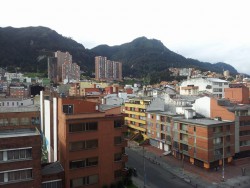
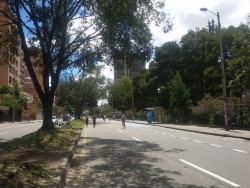

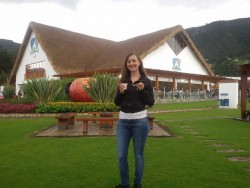
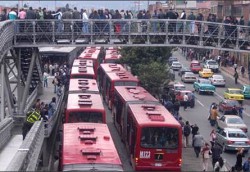
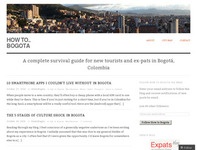 Naomi is a British expat living in Colombia. Blog description: A complete survival guide for new tourists and ex-pats in Bogota, Colombia (by HowtoBogota)
Naomi is a British expat living in Colombia. Blog description: A complete survival guide for new tourists and ex-pats in Bogota, Colombia (by HowtoBogota)





